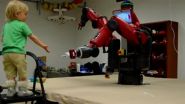(Press-News.org) PROVIDENCE, R.I. [Brown University] -- Researchers from Brown University are developing a new algorithm to help robots better plan their actions in complex environments. It's designed to help robots be more useful in the real world, but it's being developed with the help of a virtual world -- that of the video game Minecraft.
Basic action planning, while easy for humans, is a frontier of robotics. Part of the problem is that robots don't intuitively ignore objects and actions that are irrelevant to the task at hand. For example, if someone asked you to empty the trashcan in the kitchen, you would know there's no need to turn on the oven or open the refrigerator. You'd go right to the trashcan.
Robots, however, lack that intuition. Most approaches to planning consider the entire set of possible objects and actions before deciding which course to pursue. In other words, a robot might actually consider turning on the oven as part of its planning process for taking out the trash. In complex environments, this leads to what computer scientists refer to as the "state-space explosion" -- an array of choices so large that it boggles the robot mind.
"It's a really tough problem," said Stefanie Tellex, assistant professor of computer science at Brown. "We want robots that have capabilities to do all kinds of different things, but then the space of possible actions becomes enormous. We don't want to limit the robot's capabilities, so we have to find ways to shrink the search space."
The algorithm that Tellex and her students are developing does just that. David Abel, a graduate student in Tellex's lab, led the work and will present it this week at the International Conference on Automated Planning and Scheduling.
Discovering the likely path
The algorithm augments standard robot planning algorithms using "goal-based action priors" -- sets of objects and actions in a given space that are most likely to help an agent achieve a given goal. The priors for a given task can be supplied by an expert operator, but they can also be learned by the algorithm itself through trial and error.
The game Minecraft, as it turns out, provided an ideal world to test how well the algorithm learned action priors and implemented them in the planning process. For the uninitiated, Minecraft is an open-ended game, where players gather resources and build all manner of structures by destroying or stacking 3-D blocks in a virtual world. At over 100 million registered users, it's among the most popular video games of all time.
"Minecraft is a really good a model of a lot of these robot problems," Tellex said. "There's a huge space of possible actions somebody playing this game can do, and it's really cheap and easy to collect a ton of training data. It's much harder to do that in the real world."
Tellex and her colleagues started by constructing small domains, each just a few blocks square, in a model of Minecraft that the researchers developed. Then they plunked a character into the domain and gave it a task to solve -- perhaps mining some buried gold or building a bridge to cross a chasm. The agent, powered by the algorithm, then had to try different options in order to learn the task's goal-based priors -- the best actions to get the job done.
"It's able to learn that if you're standing next to a trench and you're trying to walk across, you can place blocks in the trench. Otherwise don't place blocks," Tellex said. "If you're trying to mine some gold under some blocks, destroy the blocks. Otherwise don't destroy blocks."
After the algorithm ran through a number of trials of a given task to learn the appropriate priors, the researchers moved to a new domain that it had never seen before to see if it could apply what it learned. Indeed, the researchers showed that, armed with priors, their Minecraft agents could solve problems in unfamiliar domains much faster than agents powered by standard planning algorithms.
Having honed the algorithm in virtual worlds, the researchers then tried it out in a real robot. They used the algorithm to have a robot help a person in the task of baking brownies. The algorithm was supplied with several action priors for the task. For example, one action prior let the robot know that eggs often need to be beaten with a whisk. So when a carton of eggs appears in the robot's workspace, it is able to anticipate the cook's need for a whisk and hand him one.
In light of the results, Tellex says she sees goal-based action priors as a viable strategy to help robots cope with the complexities of unstructured environments -- something that will be important as robots continue to move out of controlled settings and into our homes.
The work also shows the potential of virtual spaces like Minecraft in developing solutions for real-world robots and other artificial agents. "I think it's going to provide a way for very rapid iteration for algorithms that we can then run in our robots and have some confidence they're going to work," Tellex said.
For this particular paper, the team used very small domains in a Minecraft mock-up in order to help the algorithm learn more quickly. But the team has now developed a modification -- a mod -- enabling the algorithm to run in the real game, freely available online. The mod was developed using BURLAP, a code library curated at Brown for learning and planning algorithms. The team hopes other researchers can use it to solve new problems, or that regular Minecraft players might find it useful.
In the real game, the researchers hope to use their algorithm to perform tasks in larger and larger Minecraft domains -- and ultimately perhaps all of Minecraft. That would be a huge leap for artificial intelligence.
"The whole of Minecraft is what we refer to as 'A.I. complete,'" Tellex said. "If you can do all of Minecraft you could solve anything. That's pretty far off, but there are lots of interesting research objectives along the way."
INFORMATION:
Other authors on the paper were David Ellis Hershkowitz, Gabriel Barth-Maron, Stephen Brawner, Kevin O'Farrell, and James MacGlashan. Krishna Aluru, an undergraduate student at Brown, developed the Minecraft mod.
Researchers at the University of Illinois at Urbana-Champaign have uncovered physical mechanisms allowing the manipulation of magnetic information with heat. These new phenomena rely on the transport of thermal energy, in contrast to the conventional application of magnetic fields, providing a new, and highly desirable way to manipulate magnetization at the nanoscale.
"In our study, we make use of the fact that a heat current passing through a magnetic material creates a separation of electron spins. This process creates a current of magnetic dipoles that we use to manipulate ...
DARIEN, IL - A new study suggests that increased restless legs syndrome (RLS) severity is associated with subsequent increased risk of stroke.
Results show that increased RLS severity is associated with subsequent increased risk of stroke, after considering other known risk factors such as age, smoking, hypertension, and unhealthy diet. There were 161 incident stroke cases during the six-year follow-up.
"We were surprised at the importance of taking into account RLS severity -- it was only severe RLS, not milder RLS, that was associated with increased risk of stroke," ...
DARIEN, IL - A new study suggests that lower life satisfaction is linked to sleep problems during midlife.
Respondents with higher life satisfaction reported shorter sleep onset latency (SOL). Sleep onset delay among those with low life satisfaction could be the result of worry and anxiety, as reported elsewhere. These findings support the idea that life satisfaction is interlinked with many measures of sleep and sleep quality, suggesting that improving one of these variables might result in improving the other.
"These findings support the idea that life satisfaction ...
URBANA, Ill. - Emerging adults aged 18 to 25 are often criticized for their poor interpersonal skills, sense of entitlement, and casual work ethic. But a new University of Illinois study suggests that fault-finding adult co-workers could make a big difference in young workers' leadership development by developing relationships with them, modeling the behaviors they wish to see, and providing leadership growth opportunities.
"Young adults in our study had learned a lot from mentors who modeled initiative, drive, and persistence; demonstrated how to communicate with confidence ...
DARIEN, IL - A new study suggests that children with traumatic brain injuries (TBI) have poorer sleep and more daytime sleepiness in comparison to healthy children.
Results show that children with TBI were more likely to experience greater daytime sleepiness, sleep disturbances and a poorer overall sleep quality. The children with TBI also had impaired emotional, physical and social functioning when compared to healthy children.
"We were surprised that children with a TBI experienced persistent increases in daytime sleepiness and decreases in sleep quality compared ...
A nuclear physicist and an archaeologist at the University of York have joined forces to produce a unique appraisal of the cultural significance of one of the world's most important locations for scientific inquiry.
In a paper published in the journal, Landscapes, Professor David Jenkins, of the Department of Physics at York, and Dr John Schofield, Head of the University's Department of Archaeology, have investigated CERN, the home of the Large Hadron Collider on the Franco-Swiss border.
Situated between the Jura Mountains and the Alps, CERN was established in 1954 to ...
This news release is available in German.
Material scientists at ETH Zurich and the Max Planck Institute of Colloids and Interfaces in Potsdam have developed a new type of sensor that can measure carbon dioxide (CO2). Compared with existing sensors, it is much smaller, has a simpler construction, requires considerably less energy and has an entirely different functional principle. The new sensor consists of a recently developed composite material that interacts with CO2 molecules and changes its conductivity depending on the concentration of CO2 in the environment. ...
Jackson Laboratory researchers have shown that using an electric current to deliver the CRISPR/Cas9 system, in order to engineer genetic changes in laboratory mice, is highly efficient and significantly improves the system's throughput.
CRISPR/Cas9 has significantly enhanced the precision, speed and ease with which experimental organisms can be genetically modified in order to create models of human diseases. Mice carrying mutations in single or multiple genes or other modifications can be created in one step by injecting the CRISPR/Cas9 system into zygotes (the cells ...
Metabolism experts are increasingly convinced that obesity and many of the pathogenic changes it entails, such as Metabolic Syndrome and type 2 diabetes, are a result of chronic inflammatory processes in fatty (adipose) tissue. The adipose tissue of obese people exhibits higher-than-normal quantities of almost all types of immune and inflammatory cells.
"We are quite convinced that immune cells play a role in the pathogenic consequences of obesity," says Professor Hans-Reimer Rodewald of the German Cancer Research Center (Deutsches Krebsforschungszentrum, DKFZ). "But ...
Scientists have discovered a trigger that allows breast cancer cells to spread to the lungs.
They have found that blocking the signals in mice with breast cancer greatly reduces the number of secondary tumours found in the lungs.
The findings could lead to new therapies that stop the progression of breast cancer, the researchers at the University of Edinburgh say.
The majority of deaths from breast cancer are caused by the tumour spreading to other parts of the body. The lung is often one of the first organs to be affected.
Researchers at the University's MRC Centre ...


